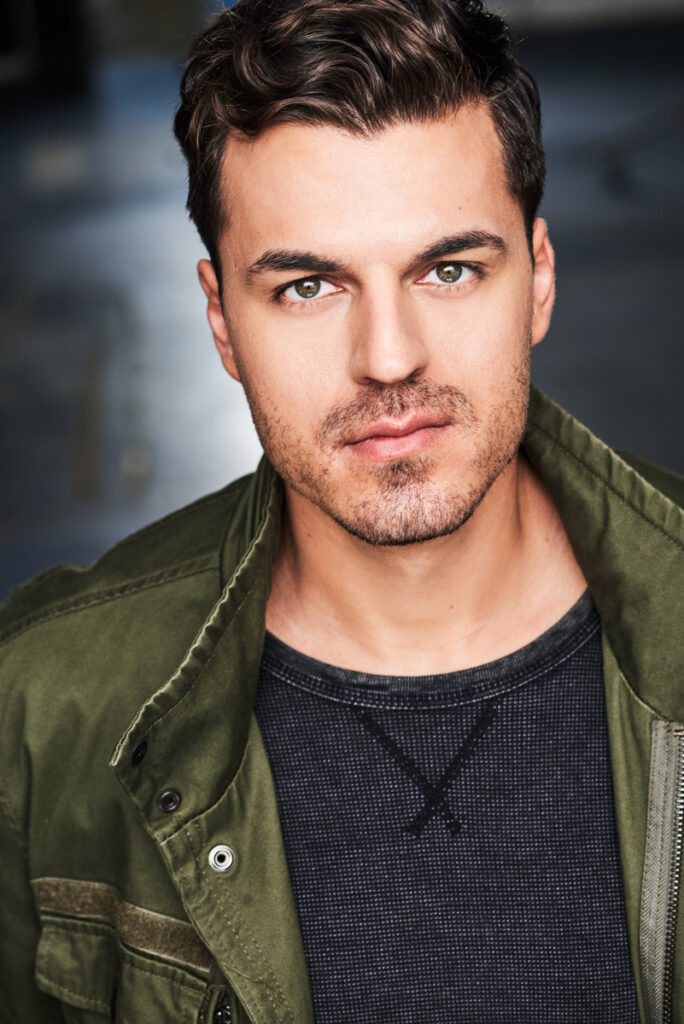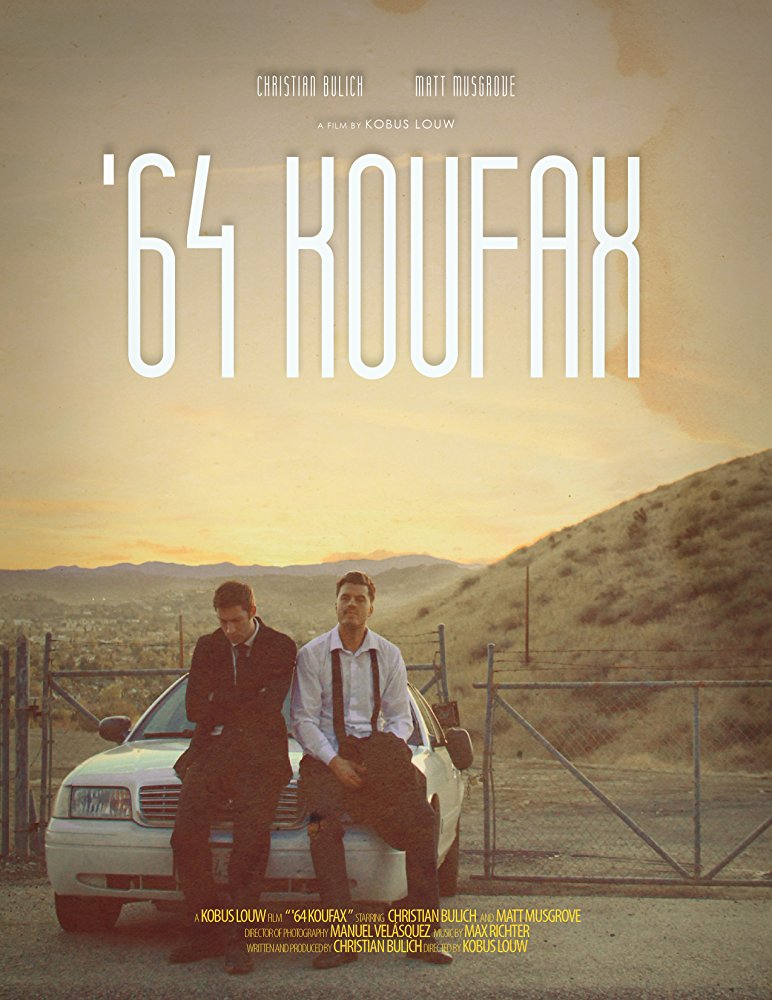‘64 Koufax is an indie film with an important message: relationships matter. Following two brothers as they navigate together through a problematic moment in their relationship, the film has the depth and humanity that can only come from a passion project. Recently spotlighted by Occhi Magazine, New York Film Academy (NYFA) MFA Acting for Film grad Christian Bulich poured himself into ‘64 Koufax not only by writing the script and portraying the protagonist, but also by producing.
For the NYFA Blog, Bulich discusses the hurdles and rewards of taking on so many roles within a film production, and how his fellow actors can best poise themselves to successfully produce their own work. Check out what he has to say:
NYFA: First, can you tell us a little bit about your journey and what brought you to the New York Film Academy’s MFA in Acting for Film program?
CB: Before I came to NYFA I had mostly done stage work and didn’t really have any real experience with film sets, so I was kind of desperately looking for a school that offered an acting program with a distinctive focus on camera work.
After finding NYFA through some online research, I spent time going through the website, and it didn’t take me long to realize that this was the right choice for me. The combination of the hands-on experience and the variety of classes that the MFA program consists of was exactly what I was looking for.
Actually, I remember also getting in touch with some students who were enrolled in one of the programs at NYFA at that time and asking about their experience, and all of them had only positive things to say. So at the end of the day it was a pretty easy choice for me.
NYFA: Why acting? What makes you passionate about this craft?
CB: There are so many things that make me passionate about it. I could talk about this topic for days. To make it short, I love this craft because it simply makes me really happy.
Already at an early age I noticed the satisfying feeling when I was doing plays and working on different characters and just being involved in a creative environment. With time this feeling just became stronger and stronger, and to this day I love finding new things about myself, and that I can connect to the characters that I’m working on.
I know it might sound cheesy right now but it sometimes actually feels sort of therapeutic to me. Acting makes you think about certain things in a different way, which can be a good thing sometimes.
NYFA: What was your experience like coming to Los Angeles for acting, all the way from Germany?
CB: Well, coming to Los Angeles was not my first experience living in the states. I’ve lived in New York before and had some of the most significant experiences in my life out there. But coming to Los Angeles was a bit different compared to New York, since my moving to the west coast was completely acting-related, and nothing else.
So overall I can say that it’s a completely different world compared to Germany in regard to the acting business. It’s so much faster and more demanding out here, and Hollywood just has so much more to offer than the German market. I guess the variety and the amount of projects that are being produced out here is one of the most attractive aspect of living in LA for me personally.
But the number one reason why I actually never want to leave this place is that almost everybody I meet shares the same passion for film and the craft in general. To be able to share thoughts and have great conversations with people who love the same thing you love — that’s pretty special.
NYFA: Do you have any favorite NYFA moments from your time studying with us?
CB: The showcase performances and the student-directed plays are definitely my favorite moments.
There is something special about meeting new people and working with them on a play or a scene for weeks, and then performing it, and afterwards celebrating the success together. You grow really close during those moments, and these people become sort of a second family for you. And that’s exactly who I still keep in touch with even after graduating: students and teachers who were involved in these projects.
NYFA: What inspired you to create and produce your short film ’64 Koufax?
CB: All my favorite movies have one thing in common; relationships.
In my opinion, there is nothing more interesting than the connection between people. A story that deals with relationships between friends, family, couples, or other individuals will always be something that the audience can easily relate to, and maybe find themselves in one of the characters — which as a result might even help with certain personal matters. That was my exact intention with ’64 Koufax.
Growing up I always had a distinctive view on family and friends and their importance in my life. Nonetheless, I had many fights with some of them about things that might seem stupid now, but back then were very important to me. And because of these disagreements I have lost some very important friends and caused some cracks in relationships with some of my relatives. With time you start realizing that there is nothing more important than these people, and that no matter what you should always hold together through good and bad times.
The story of ’64 Koufax deals with this message. It shows two brothers going through a very difficult time in their lives, in which both make desperate decisions that affect each other in negative ways. But they realize that without each other there is nothing left, and that they have to do their best and find a way back to each other.
NYFA: What was the experience like for you in ‘64 Koufax, flowing through so many different roles in production — producer, writer, star? What surprised you most?
CB: That was not easy! Honestly, I wasn’t expecting it to become such a difficult affair. The process of writing the story and working on the character of Terry was very inspiring and I had lots of fun doing that, but then I decided to produce that thing and, well … yeah … not as easy as I thought it will be. I guess since I have never produced any films before I overestimated myself a little bit. The production process prior to the shoot was actually not too bad, and everything went mostly as planned. But as soon as we got to set and started shooting, my head was all over the place. I had a difficult time focusing on just the acting part and leaving alone the production part. So every small problem on set became a problem that affected me as a producer.
Of course, I had great people on set who did an amazing job coordinating everything, but even though I wasn’t actively helping out with set issues my mind was jumping back and forth from being Terry to being Christian the producer. So overall it was a bit of a frustrating experience, because I could’ve done better performance-wise, in my opinion. But I also have to say that I learned a lot throughout that process and definitely grew as a person and actor.
[su_carousel source=”media: 26007,26006″ link=”lightbox” width=”780″ height=”360″ title=”no” autoplay=”0″]
NYFA: Did producing your own short film change the way you approach acting?
CB: That’s a good question actually. I haven’t really thought about that. I kind of separated the production process and the acting process completely from each other, or at least I was trying to do that. I think the experience of ’64 Koufax definitely showed me how important it is to have a clear mind on set as an actor.
NYFA: What is your advice to acting for film students who want to produce their own films?
CB: Don’t do it! No, I’m just kidding. I think everyone should make this experience and grow from it. So if you decide to produce your own film, I’d suggest you create a clear schedule and always be on time with what you set up to achieve. That way you will have less problems on the day of the shoot and you’ll be able to completely focus on just the acting part.
Also, choose your crew wisely. Find quality people you trust! That’s the only way you can survive on set with a double duty of acting and producing.
NYFA: What’s next for you? Any upcoming projects you can tell us about?
CB: I’m currently working on two projects that I’m very excited about. The first one is a short film that we’re aiming to shoot in May. It’s a piece about a father-son relationship and their differences in religious beliefs. This film will be directed by Kobus Louw, who also directed ’64 Koufax. We will also have the whole crew of our previous project working with us again, which I’m incredibly excited about.
The second project we’re currently working on is a feature film that we are planning to shoot in early 2019. It’s a very interesting concept. All I can say about it right now is that it’s a very uncommon love story with it’s own unique genre.
NYFA: Would you say your time at NYFA was at all useful for the work you are doing now?
CB: Oh, yes! It actually turned out even better than I expected it to be. And I’m not saying that because this is a NYFA Blog interview and I have to say nice things about this school. I honestly feel like I have gained so much useful experience and knowledge during my time at NYFA, which really helps me on daily basis in this industry.
In addition to that, I have met some of the best teachers at this school that I have ever worked with and some of the most amazing students that I keep creating great content with.
The New York Film Academy would like to thank Christian Bulich for sharing his story, and say congratulations on wrapping production on ‘64 Koufax!

